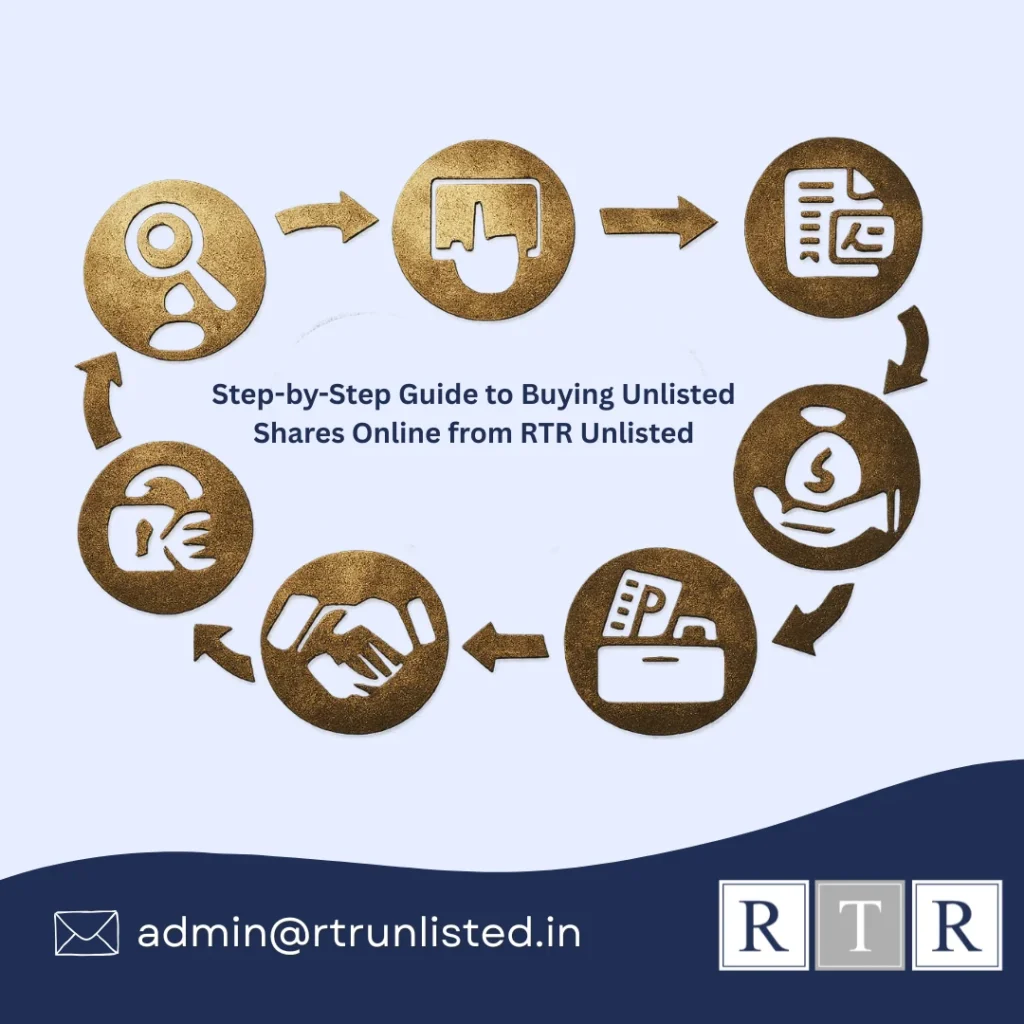
Investing in unlisted shares (pre-IPO or private company equity) can offer attractive upside — but it also brings higher risk, lower liquidity, and regulatory complexity than listed stocks. This step-by-step guide explains how to buy unlisted shares online using platforms such as RTR Unlisted, what to check before you transact, the exact operational steps, and practical safety tips. Wherever useful, I’ve cited recent guidance, platform info and regulator alerts so you can act informed.
Quick reality check — what you must know first?
-
Unlisted shares aren’t traded on exchanges. Transactions typically happen OTC (over-the-counter) through specialized brokers/platforms or private transfers—so price discovery and liquidity are limited.
-
Regulators have flagged risks and unauthorized platforms. SEBI has warned investors about trading in unlisted securities via unauthorised electronic platforms; always verify platform credentials and processes.
-
High return and high risk. Pre-IPO/unlisted investing can pay off if the company lists at a premium — but many retail investors have also faced losses when listings disappointed. Exercise caution.
Why consider buying through RTR Unlisted?
RTR Unlisted positions itself as a platform that lists verified unlisted & pre-IPO opportunities, provides pricing, and assists with transfers to your demat account. Their site outlines a browse → select → transact → transfer workflow and lists customer support and testimonials. (Always confirm current company credentials and contact details on their site.)
Step-by-step:
1) Do your homework (research & due diligence)
-
Read company financials, cap table, investor presentations and any available audits. For startups, check founders, funding rounds, burn rate and runway.
-
Check the platform’s credibility: registered office, KYC/AML processes, escrow/holding mechanisms, customer reviews and independent reputation checks. For RTR, confirm contact details shown on their site and cross-verify reviews.
2) Pick the right route/platform
Common ways to buy unlisted shares in India:
-
Specialised platforms / marketplaces that list pre-IPO and unlisted shares (e.g., RTR Unlisted, Precize, Sharecart, UnlistedZone). These platforms connect buyers/sellers and may handle documentation & transfers.
-
Brokers / intermediaries (wealth managers or registered broker-dealers) who source deals and execute transfers.
-
Private transactions (direct transfers from current shareholders or ESOP holders) — higher diligence needed.
Tip: Prefer platforms that use escrow, have transparent fee schedules, and can transfer shares directly into your Demat account.
3) KYC, accounts & paperwork
-
You must have a Demat account (CDSL/NSDL) and an active trading/DP relationship. Platforms will require PAN, Aadhaar (where applicable), bank proof, and DP/CML documents.
-
RTR and similar platforms require full KYC and a signed agreement specifying transfer mechanics — read it carefully.
4) Price discovery & negotiating the deal
-
Platforms show an indicative market price or matching bids/asks. For private deals, negotiate via the intermediary. Be aware of commissions and taxes.
5) Payment & escrow
-
Use the payment methods required by the platform (bank transfer/UPI/NEFT). The safest route: keep funds in escrow controlled by a neutral custodian until shares are legally transferred to your Demat account. Ask for proof of escrow arrangement.
6) Share transfer (off-market transfer to Demat)
-
After payment, the off-market transfer process begins: the seller executes a transfer deed and the company/registrar or transfer agent (or the platform’s transfer services) completes dematerialisation and credits the shares to your Demat (NSDL/CDSL) via your DP. Expect verification & a few days to a few weeks depending on paperwork and company. Platforms usually outline timelines.
7) Post-purchase: custody, lock-in and exit plan
-
Check whether shares have any lock-in (some pre-IPO shares have a lock after listing). Also determine how you can sell later: through the same platform, to institutional buyers, or after listing on an exchange (subject to lock-in).
Checklist before you click “Buy”
-
Platform verified (registered office, contact, reviews).
-
Clear proof of share title and seller identity (no liens or encumbrances).
-
Escrow arrangement documented.
-
Demat account details correct; DP ready to receive off-market credits.
-
Understand tax implications and stamp duty (consult a CA).
-
Risk appetite and time horizon aligned to illiquid investment.
Common FAQs
Q: How long does transfer take?
A: Transfer timelines vary: from a few business days (if paperwork is complete and registrar cooperates) to several weeks. Platforms usually provide expected timelines.
Q: Are these platforms regulated by SEBI?
A: SEBI has warned about unauthorised electronic platforms dealing in unlisted securities. Some platforms operate as facilitators/brokers under intermediary rules; verify regulatory status and platform disclosures before using them.
Q: Can mutual funds invest in pre-IPO/private placements?
A: As of recent regulatory updates in 2025, SEBI indicated restrictions on mutual funds investing in pre-IPO placements — this is an example of evolving rules; always check the latest regulator guidance.
Safety tips & red flags
-
Red flags: Platform asks for advance payment without escrow proof; website domain with little history or negative scam-checker signals; no physical address or unverifiable testimonials. (Scam-checker sites can provide preliminary signals but do deeper checks.)
-
Do: Use escrow, insist on demat credit, verify seller identity, keep written receipts and transaction logs, and consult a financial advisor for transaction sizes above your comfort threshold.
Example: Buying via RTR Unlisted simplified
-
Create account on RTR Unlisted and complete KYC.
-
Browse listed unlisted/pre-IPO opportunities and view price & seller details.
-
Place interest / negotiate price. Platform prepares agreement.
-
Deposit funds into escrow (if offered).
-
Seller signs transfer deed; registrar effects off-market transfer to your Demat.
-
Shares appear in Demat; escrow is released to seller.
(Exact steps/timings will depend on the deal and platform processes always confirm on the platform.)
Sources
Here are the primary sources I used (official notices, platform pages, regulator coverage and reputable industry explainers). I’ve listed each source with a one-line description and the web citation so you can open the original directly.
-
SEBI — warning about unauthorised electronic platforms trading unlisted securities — Regulator alert cautioning investors against trading in unlisted securities via unauthorised platforms (Dec 2024). Reuters
-
RTR Unlisted — official site / platform pages — RTR Unlisted home page and platform information (used to illustrate the platform workflow). RTR Unlisted+1
-
NSDL — Off-Market Transfers / e-services — Official procedural reference for off-market transfers and demat services. NSDL+1
-
Reuters — SEBI / mutual funds & pre-IPO (recent regulatory developments) — News on regulator actions and evolving restrictions (example of regulator coverage of pre-IPO risks and policy moves). Reuters+1
-
Economic Times / Business-Standard / NDTV (industry reporting on SEBI alerts & pre-IPO rules) — Media reporting and explanation of SEBI’s investor warnings and related developments. The Economic Times+2Business Standard+2
-
ShareScart — Practical guide to buying unlisted shares (platform explainer) — Practical risks, liquidity, and marketplace explanations for unlisted shares. Sharescart
-
Equirus Wealth — How to buy and sell unlisted shares (guide, 2025) — Step-by-step process overview for buying/selling unlisted shares and market context. Equirus Wealth
-
UnlistedZone / UnlistedHub / The Alt Investor — How off-market transfers & demat credit work — Guides that explain ISIN, DP/DPID, DIS, and stamp duty considerations for off-market transfers. Unlisted Zone+2Unlisted Hub+2
-
Vinod Kothari (blog/legal commentary) — Legality and risks of digital platforms offering unlisted shares — Legal perspective and regulatory commentary about “share hawkers of the digital era” and platform risks. Vinod Kothari Consultants
-
Industry commentary & warnings (Times of India, 1Finance, other investor education pieces) — Additional market commentary and investor-risk writeups (useful for safety tips and investor cautions). The Times of India+1
Mail us :- admin@rtrunlised.in
To Read More Blogs:- Click Here
